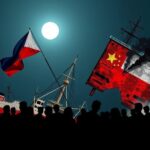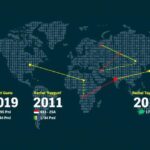Putin Hosts 36 World Leaders at Brics Summit, Challenging Western Isolation
Russian President Vladimir Putin hosted the Brics summit in Kazan, attended by 36 world leaders, including leaders from China, India, and Iran. This gathering aims to counter the narrative of Russia’s isolation despite ongoing international scrutiny over war crimes. The summit included discussions on economic strategies to reduce reliance on the US dollar, though diverging views within the group raise questions about ideological unity. Putin’s hopes for a renewed international standing amidst changing political tides characterize this significant diplomatic event.
Russian President Vladimir Putin is hosting 36 world leaders at the Brics summit in Kazan, a gathering that includes nations such as China, India, and Iran. This event, occurring over three days, is intended to demonstrate that Moscow is not isolated, despite being ostracized by the West and facing allegations from the International Criminal Court regarding war crimes. Kremlin officials assert that representatives from these nations are attending various summit activities, marking it as the largest international meeting Putin has convened since the onset of his full-scale Ukraine invasion in February 2022. Putin will engage in significant bilateral discussions with several key leaders, including Chinese President Xi Jinping and Indian Prime Minister Narendra Modi, in addition to holding numerous other meetings. The summit signifies an effort by the Brics group, originally comprising South Africa, Russia, China, Brazil, and India, to portray itself as a representative of a global majority challenging Western influence, particularly the dominance of the US dollar in global finance. Among potential attendees is UN Secretary-General António Guterres, though his participation remains uncertain as he faces pressure from the West regarding the summit. Leaders from other nations, including Algeria, Azerbaijan, and Mexico, are also present, culminating in a diverse representation. Although the Brics group has expanded with new members such as Egypt and the United Arab Emirates, experts caution that the growth could dilute a unified ideological standpoint among members. Brazil and India are more moderate in their stance against the dollar compared to Russia and China, leading to diplomatic complexities. Analysts suggest that the Brics summit serves as a significant platform for Putin, as it asserts that Russia remains a vital player on the world stage despite the ongoing conflict in Ukraine. As Putin appeared unable to attend the previous summit in South Africa due to arrest risks, the current gathering represents a potential revival of Russia’s diplomatic image. The ongoing geopolitical climate, including the potential return of Donald Trump to US leadership and the prevailing sentiment of war fatigue in Europe, creates an evolving landscape for discussions surrounding Ukraine. Moreover, the Brics+ initiative seeks to construct economic and technological frameworks immune to US sanctions while boosting the international relevance of the yuan as an alternative to dollar dependency. Despite having a larger collective GDP than the G7 and the EU, Brics nations carry lesser influence in global financial institutions due to voting power being based on financial contributions, underscoring the challenges the group faces moving forward.
The Brics group, established to foster cooperation among emerging economies, has expanded beyond its original five members—Brazil, Russia, India, China, and South Africa—to include additional countries aiming for membership. This summit reflects an intentional effort by the group to position itself as a counterbalance to Western dominance, particularly that of the United States. The meeting represents a critical juncture in international relations, particularly in the wake of Russia’s controversial actions in Ukraine and efforts by various leaders to recalibrate their foreign policy in response to US influence. As allegations against Putin persist, the assembly stands as an opportunity to reaffirm Russia’s significance on the global stage, promoting a narrative that portrays the country as an essential player in shaping a new world order. The broader implications of this gathering, especially concerning the economic strategies aimed at circumventing the US dollar, are intertwined with the current geopolitical dynamics of the post-pandemic world.
In conclusion, the Brics summit hosted by President Putin signifies an important diplomatic initiative amidst a backdrop of geopolitical tensions. With the participation of leaders from numerous countries, the gathering seeks to project a unified stance against perceived Western hegemony and the dominance of the US dollar. While the summit underscores Russia’s attempt to reaffirm its role in international affairs, it also reveals the complexities of maintaining ideological cohesion among diverse member states with varying interests. The outcomes of this summit may significantly influence the future trajectories of both the Brics group and the broader geopolitical landscape.
Original Source: www.theguardian.com







Post Comment